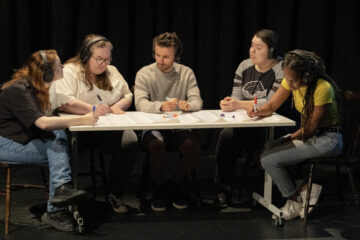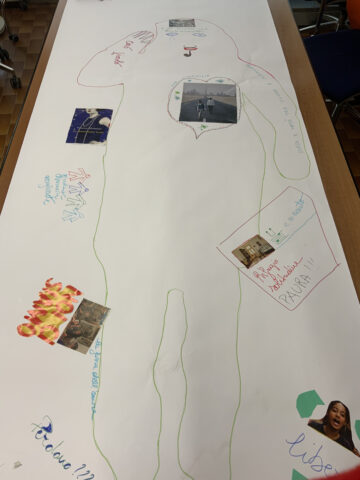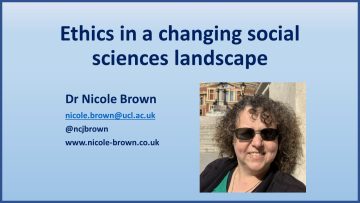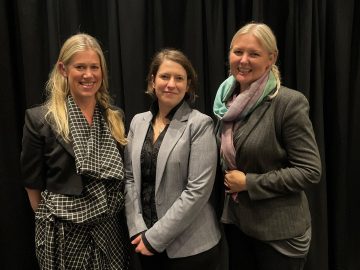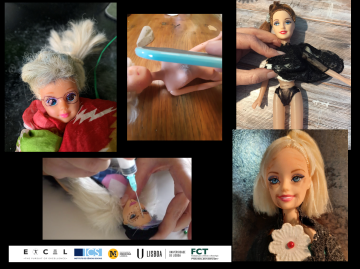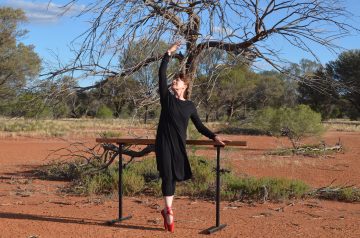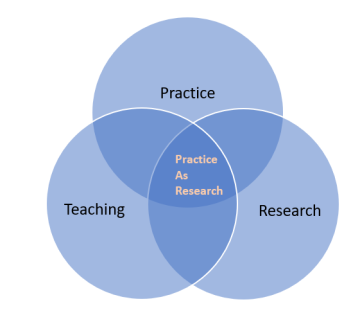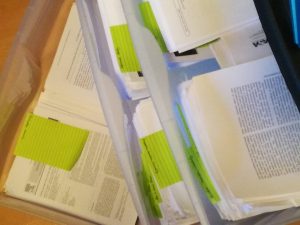In this blog post Julia Dobson and Hattie Lowe report on the Ethics and Practice As Research conference:
On Tuesday 11th June, a group of interdisciplinary researchers and practitioners gathered at the UCL Institute of Education to discuss and share insights on the ethics of researching with children and young people. As two doctoral candidates, Julia and Hattie, conducting research with young people, we reflect on the day’s sessions and emerging themes.
In the first presentation, Professor Jenny Parkes reflected on the ethics of researching violence with young people in the CoVAC (Contexts of Violence in Adolescence Cohort) study, which used the River of Life method with adolescents in Uganda to narrate their experiences through metaphor, drawing and discussion. The method supported adolescents to convey meanings on a difficult topic, co-constructing a narrative that reflected what they wanted to present to the world. The presentation illuminated stimulating discussions on the assumptions that appear inherent in the participatory methods discourse. Participatory methods aren’t always more ethical – they don’t automatically eradicate power imbalances and they are not devoid of the potential to re-traumatise participants. Doing participatory research in meaningful and ethical ways with children requires flexibility, creativeness and time investment, and Jenny ended with a thought-provoking quote from Spyros Spyrou (2011) who states “the quick and easy way is not necessarily the most ethical way; the ethical way necessities time for reflection”.
Dr Amanda McCrory began her presentation by posing a similar provocation: “it is dangerous to assume that just because a piece of research has been passed by an ethics committee then it is ipso facto an ethical piece of research”. She then introduced a series of thought-provoking ethical considerations when involving children as active researchers. She called on us to start with ourselves: asking, for example, how can we be a ‘critical friend’ to young researchers, rather than a ‘controlling expert’? She then invited us to consider different ways in which children become more involved in both the ethics process and the research. It was inspiring to learn from Amanda’s approach to ethically – and dynamically – engaging young people in research, including: accessible explanations of the research process, checking in regularly with students, offering sufficient training, and thinking carefully about what will be meaningful and beneficial for the young people involved.
Dr Jessica Hayton’s presentation centred on the language we use in research ethics processes and how this impacts the meaningful engagement of children. Terms that researchers take for granted, such as ethics, consent and honesty, can mean entirely different things to children, demonstrated through audio clips from Jess’ 5-, 7- and 11-year-old nieces, one of whom initially confused ‘ethics’ with ‘Essex’ (a town in England) though also understood the term as “something to do with science”. Without a shared language through which to discuss ethics, we stumble at the first hurdle. There was interest from the audience in how we invest more into slow and iterative ethical engagement with children in the face of time, funding and institutional constraints. Jess concluded with the argument that doing ethics well with children doesn’t have to be complicated, we can ask children and families what they need, and we can be creative in how we present information, but we must build these processes in from the very beginning.
In their joint presentation, Dr Ruolin Hu and Dr Sara Young shared findings from their pilot study exploring postgraduate students’ views towards research ethics and the ethics approval procedure. They began by inviting us to reflect upon how we can present ethics as a way of learning, rather than a tick box exercise. Although there is growing awareness that ethics goes beyond the approval procedure, fear of the form can still be dominant in students’ perceptions of research ethics. Sara and Ruolin’s research suggests that students may start their course with little understanding of research ethics. Embedding ethics throughout research training programmes, rather than having separate sessions, could support students to develop their conceptualisation of and confidence in ethical research. Taking part in this pilot research also helped students to develop their understanding of research ethics, so it is great that more students will be able to benefit in the wider scale study.
The final session of the day was a Q&A with Dr Nicole Brown, Nishita Nair and Dr Nicolas Gold, who between them have a wealth of experience sitting on research ethics committees and conducting participatory and creative research with children and young people. Discussions explored how we classify vulnerability, the need to be accountable with dissemination, AI in research, the importance of relationship building with parents and caregivers when doing research with children, safeguarding training for student researchers and avoiding editorial bias. Our thoughtful and thought-provoking panellists closed the Q&A by emphasising the university’s responsibility to protect researchers and participants, and get people interested in ethics through capacity building alongside procedures.
Personal reflections
Hattie: The discussion during the Q&A about how we can generate more interest in research ethics, rather than seeing it as a procedural hoop we have to jump through, resonated with my own doctoral research which explores adolescents’ perspectives on violence against women through participatory peer-research. If we re-centred our perspective on ethics procedures and saw them as an opportunity, could the ethics process add to our projects in transformative ways? Through the questions that research ethics encourages us to interrogate, we could work towards optimising children’s engagement, enjoyment and empowerment, rather than focusing on how we need to protect them through limiting their participation in ‘sensitive’ research as ‘vulnerable’ participants.
Julia: Discussions in both Jenny’s talk and the Q&A about ethical research endings were particularly timely for me, as my doctoral fieldwork draws to a close. As Jenny reminded us, thinking carefully through how we end research is so important. I was struck by the complexity of endings, and what they might bring up for both researchers and participants. For me, this process has brought up emotional and practical considerations, including how to: deliver feedback to schools; give thanks to students and staff; draw our activities to a satisfactory end; and meaningfully honour our research relationships. The conference discussions offered support, ethical grounding and solidarity, as I grapple with these ethical questions.
To conclude, it was brilliant to have the time and space to engage in ethical dialogue with colleagues from diverse positions across UCL. Such interdisciplinary dialogues hold the potential to be transformatory for ethical research procedure and practice – we look forward to continuing the conversation!
Thank you to Dr Sara Young for leading the organisation of this fantastic event, and thank you to Dr Ross Purves and Dr Giuliana Ferri for their excellent facilitation.
Funding was awarded from the IOE Faculty Research Budget, and by the IOE Department of Curriculum, Pedagogy and Assessment (CPA).
